- Home
- Get Help for Addiction
- Homelessness and Addiction
Homelessness and Addiction
Sadly, addiction is often a direct result of homelessness. A recent study found that the prevalence of substance misuse among rough sleepers is increasing with around 6 in 10 people struggling with a drug or alcohol-related problem. [1]
If you are homeless and struggling with substance misuse, or you know someone who is, reach out to the Rehab Recovery team today. We can help discuss your options for treatment. Recovery is achievable with the right help. Call today on 0800 088 6686.
What’s the connection between homelessness and addiction?
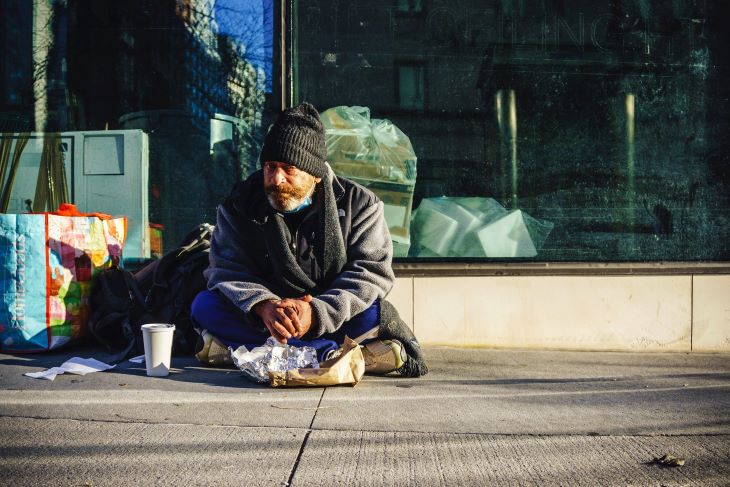
Unfortunately, addiction and homelessness go together hand in hand with women, young people, and the LGBTQ+ community more directly affected.
Homelessness can often lead to addiction and addiction can lead to homelessness, causing a vicious cycle that is difficult to break.
The challenging conditions of living on the street, struggling with chronic pain, trying to source food, and suffering from mental health conditions can cause individuals to develop both a substance use disorder and psychiatric disorders.
Therefore, it is not uncommon for those affected by homelessness to seek solace in alcohol or drugs.
For individuals who are already struggling with employment or are unable to pay their bills, the onset of an addiction can cause them to lose their housing. For most people, substance abuse is a result of homelessness and not a cause.
In 2014, 80% of homeless people in England reported issues with their mental health, with 45% having been diagnosed with a mental health condition at some point in their lives. [2]
This leaves homeless people in a very vulnerable position, not having adequate access to professional treatment for their mental health or addiction.
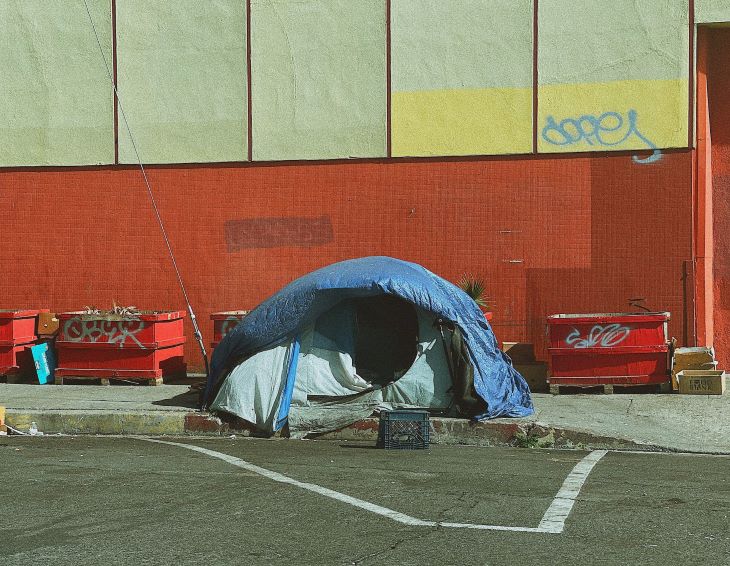
The most common mental disorders homeless people are diagnosed with are:
- Schizophrenia
- Major depressive disorder
- Generalised anxiety disorder
- Post-traumatic stress disorder (this is particularly high in those who have been sexually assaulted or are army veterans)
- Bipolar disorder
Homelessness and addiction can become interlinked because individuals struggling with mental health conditions are at an increased risk of experiencing assault and abuse. This could cause people living on the street choose to seek safety in drugs and alcohol.
Self-medicating is a coping mechanism used by many homeless people in an attempt to make themselves feel better.
Whilst many believe using drugs and alcohol will suppress the symptoms of mental health conditions, it can further aggravate them causing a severe dependence and continued destruction, placing them in fatal danger.
Struggling with both a substance use disorder and a mental health condition is known as a dual diagnosis.
Many rehab clinics provide specialist dual diagnosis support to help individuals reach sobriety. without these measures in place, the needs of these individuals are often not met which can result in a wide range of issues.
If you or someone you know is struggling with homelessness and addiction, reach out to the Rehab Recovery team today. We can help discuss your options for treatment. Recovery is achievable with the right help. Call today on 0800 088 6686.
What causes homelessness?
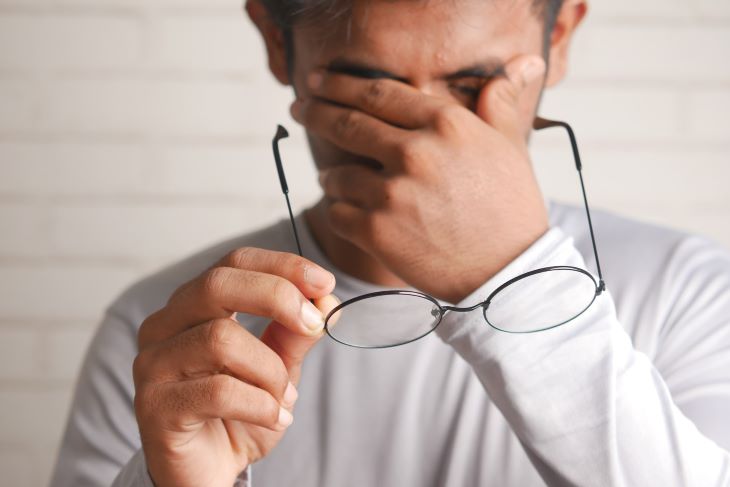
People become homeless for a wide range of different reasons. There are many social causes for homelessness such as lack of housing, living in poverty, facing unemployment and unpredictable life events.
People are also forced to live on the streets when they leave the army, prison, or care system and don’t have a home to go to. A lot of homeless people have become homeless because they cannot afford rent.
For others, the breakdown of a relationship, loss of a job, mental health problems, physical health problems and substance use cause them to lose their housing.
Being homeless can further exacerbate these issues causing homeless people to feel that there is no way out.
The reality is that homelessness and addiction are preventable, and it can be ended with the right support.
Homelessness Statistics in the UK
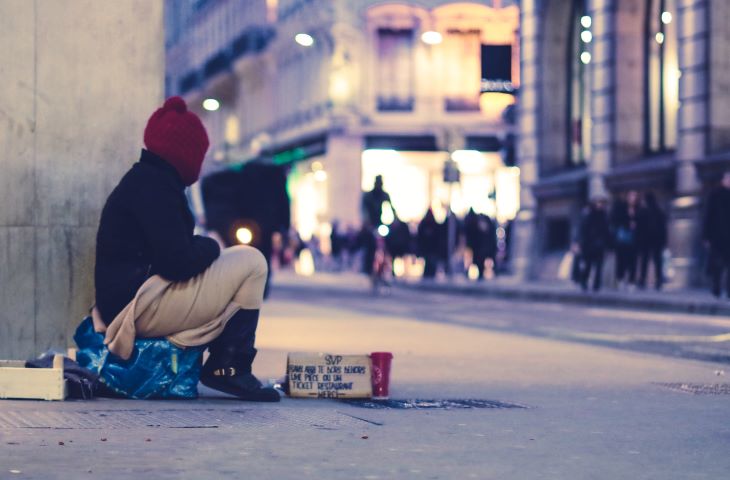
- It is estimated that homelessness is on the rise with the number of people recognised as homeless increasing from 207,600 in 2018 to over 219,000 at the end of 2019
- The average life expectancy for people experiencing homelessness is age 46 for men and age 42 for women
- People who live on the street are also 17 times more likely to have been victims of violence.
- Homeless people in the UK are also 9 times more likely to attempt suicide compared to the general population. [3]
Are there different types of homelessness?
Yes, there are different categorisations of homelessness which are as follows:
Rough sleeping
Rough sleeping is the most dangerous form of homelessness and refers to those that live directly on the streets. The longer someone is rough sleeping, the more likely it is that they will face issues surrounding addiction and their mental health.
If you or someone you know is struggling with homelessness and addiction, reach out to the Rehab Recovery team today. We can help discuss your options for treatment. Recovery is achievable with the right help. Call today on 0800 088 6686.
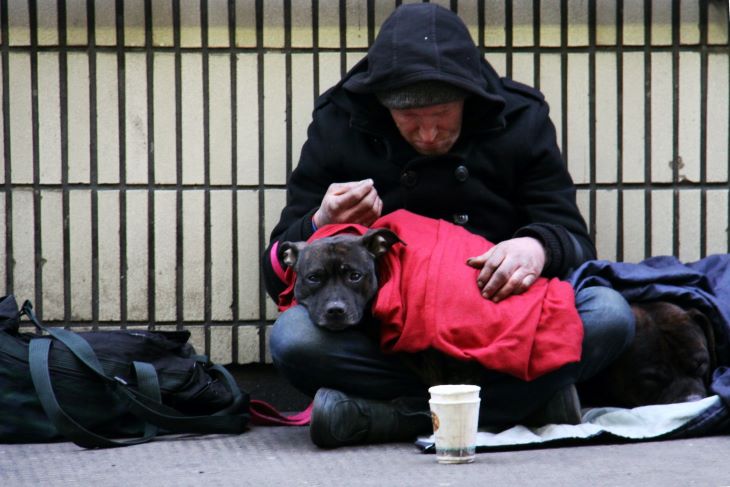
Statutory homelessness
In the UK, local authorities have a duty to secure homes for certain groups of people. This is also known as the homelessness duty. Every year, thousands of people apply to their local councils for assistance with finding housing and ending homelessness.
To be legally defined as homeless you must be able to show proof that you lack a secure place to live. Local authorities prioritise families with children and provide temporary accommodation to those who meet the homeless criteria.
Hidden homelessness
Many homeless individuals who aren’t entitled to help with housing or who don’t apply for help, are not included in official statistics. To avoid this, the charity, Crisis, carries out its own studies into homelessness each year.
Many hidden homeless people squat illegally, stay in hostels, or overcrowded accommodation. Others will stay in ‘concealed’ housing such as on the floor of a friend’s house to avoid the local authorities.
At risk of homelessness
Certain people are at risk of becoming homeless, more so than others. This includes people in low-paid jobs, those who live in poverty or those in insecure housing.
Homelessness and addiction in women
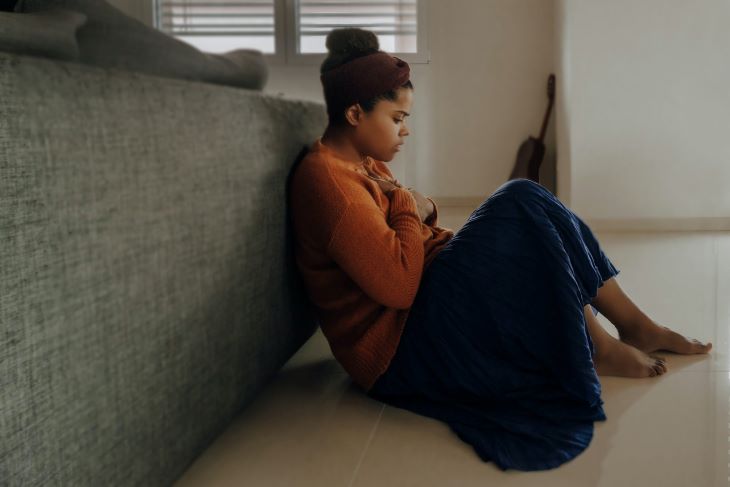
Homeless women suffer gender-based trauma. This results in higher amounts of drug use in comparison to men. It also makes them more vulnerable to sexual assault and violence.
Additional studies have shown that homeless women with a substance use disorder are also far more likely to have attempted suicide than men. [4]
Women are also underrepresented within addiction treatment, making up less than a third of clients in treatment services. Usually, it is shame, stigma, denial, and fear of legal repercussions that stop women from seeking professional help.
Many women experiencing homelessness have escaped domestic violence and choose to live on the streets instead of returning home to an abusive partner.
These life struggles can lead women to seek solice in substances, further creating a link between homelessness and addiction. Breaking an addiction is difficult for anyone, especially for homeless women whose main priority is survival and not reaching sobriety.
At Rehab Recovery, we want to challenge this and encourage you to reach out for our support. We can source immediate treatment in your local area to help you reach sobriety.
We also know that it can be especially difficult for homeless people to want to recover if they are estranged from friends and family. Without housing and a support network in place, recovering from a substance use disorder can be very hard.
If you or someone you know is struggling with homelessness and addiction, reach out to the Rehab Recovery team today. We can help discuss your options for treatment. Recovery is achievable with the right help. Call today on 0800 088 6686.
Homelessness and addiction in the LGBTQ+ community

Homelessness and addiction are major issues throughout the UK. Another group that suffers disproportionately at the hands of homelessness is the LGBTQ+ community.
Research by the Albert Kennedy Trust found that 24% of young homeless people are LGBT and 69% of homeless LGBT people had experienced violence and abuse in their family home. [5]
This is one of the reasons why many LGBT end up living on the streets. Many families reject LGBT loved ones and force them to leave home, leaving them no option but to sleep on the street. Others flee their homes due to violence and abuse.
Many LGBT people live in fear of reaching out for professional help because they don’t want to disclose their identity to local authorities and councils after having negative experiences in the past.
The same research by the Albert Kennedy Trust also showed that young transgender people faced prejudice from other service users and felt that staff were not trained at a high enough standard to understand transgender issues.
Many also criticise the availability of homelessness and addiction services for LGBTQ+ people with a substance use disorder. They believe that the government is failing to collect data that could create inclusive services and informed responses.
In recent years, there has been a development in LGBTQ+ charities aimed specifically at tackling youth homelessness such as Akt, a charity developed to help those aged 16-25 who are living in hostile or abusive environments, or who are struggling with housing.
Can homeless people access rehab?

Many homeless people delay seeking professional treatment for addiction because they think they do not qualify for help. There may also be additional barriers to treatment that differ from the general population such as:
- Lack of money to afford treatment
- Fear of reaching out due to stigma
- Inability to get transport to treatment
- Lack of education about addiction and homeless support
- No support network or family/friends to help
Fortunately, drug and alcohol rehab can be found for homeless people in the UK. Usually, these facilities are designed specifically for homeless people and provide temporary accommodation whilst patients are detoxing or completing therapy.
When it comes to sourcing addiction treatment, it is beneficial and helpful to seek a programme that addresses and includes the following:
Medication management
This involves prescribing medication to help overcome withdrawal symptoms and ease the detoxification process. Medication can also help manage mental health conditions and decrease the risk of relapsing.
If you are homeless and struggling with substance misuse, or you know someone who is, reach out to the Rehab Recovery team today. We can help discuss your options for treatment. Recovery is achievable with the right help. Call today on 0800 088 6686.

Affordable services
Many homeless people seek rehabilitation through the NHS because its services are free to all users. Others source sponsors that help them seek private treatment.
Case management
Treating addiction is only part of the problem. Treatment suitable for homeless people should also include social and housing support, as well as follow-on programmes and aftercare to ensure safety and sobriety.
Relapse prevention classes
This is a vital part of addiction treatment and can help individuals with a substance use disorder to manage their newfound sobriety. Relapse prevention helps those in treatment to recognise triggers that can be found outside of rehab.

Well-trained staff
Compassion is a key component of working with homeless individuals, especially those who are facing addiction. Sourcing a rehab clinic with a welcoming team that is invested in your recovery is vital.
Client-centred services
Private treatment offers all clients a personalised treatment plan tailored to their needs. This can be especially beneficial for a homeless person struggling with a dual diagnosis.
Comprehensive services
Finding a rehab clinic that addresses the many needs of a homeless person, including their survival and social needs, will ensure a well-rounded recovery. Holistic treatment focuses on treating a person as an individual and not just a display of their symptoms.
Getting help for homelessness and addiction

With investment and commitment, addiction can be treated. From here, it is also possible to end the relationship between homelessness and addiction.
At Rehab Recovery, we work with a range of treatment providers across the UK. Our dedicated team of helpline advisers are ready to take your call and can offer advice and guidance whether it be for yourself or for someone you know.
We know it can feel daunting to take the first step, but we understand. Many of our team members have faced addiction in the past and know how difficult it feels to acknowledge your issues.
At rehab, you can recover in a nurturing environment with people who understand. There is zero judgement, and you can connect with others in a similar position to yourself.
Creating a support network can help you adjust to life after treatment and make long-lasting friendships. Your chosen clinic will also include aftercare services to help you in your first year of sobriety.
From progress meetings to outpatient therapy, the support is endless. If you are ready to reach out, do so with Rehab Recovery by your side.
For free, confidential advice about homelessness and addiction, call Rehab Recovery on 0800 088 6686 today. Alternatively, chat to a member of our team through the LiveChat function located across the Rehab Recovery website.
Start the road to recovery today.

References
[1] 12,000 homeless people missing out on vital drug and alcohol treatment as preventable deaths soar, report finds
[2] Mental health statistics: homelessness
https://www.mentalhealth.org.uk/statistics/mental-health-statistics-homelessness
[3] About Homelessness
https://www.crisis.org.uk/ending-homelessness/about-homelessness/
[4] Women, Homelessness, And Substance Abuse: Moving Beyond the Stereotypes
https://journals.sagepub.com/doi/abs/10.1111/j.1471-6402.1995.tb00279.x
[5] The LGBTQ+ Youth Homelessness Report https://www.akt.org.uk/Handlers/Download.ashx?IDMF=59eae91c-ee80-4b6b-8ecb-158edfeeaccd


